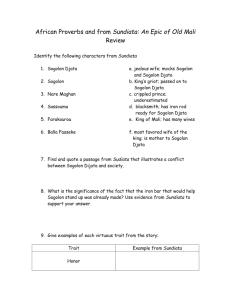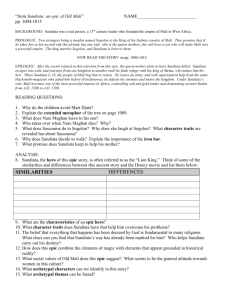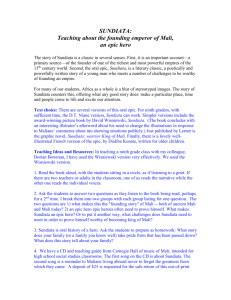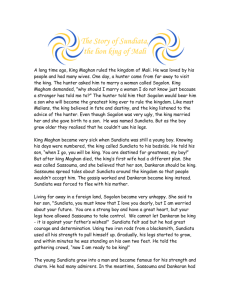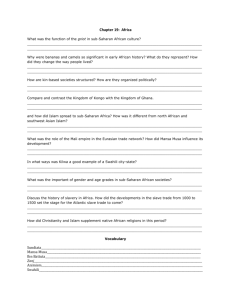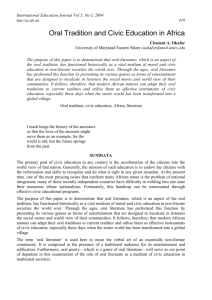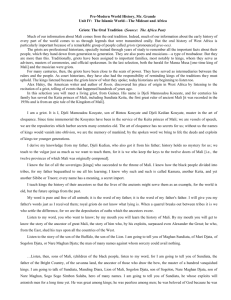Sundiata: Lion King of Mali By: David Wisniewski Listen to me
advertisement
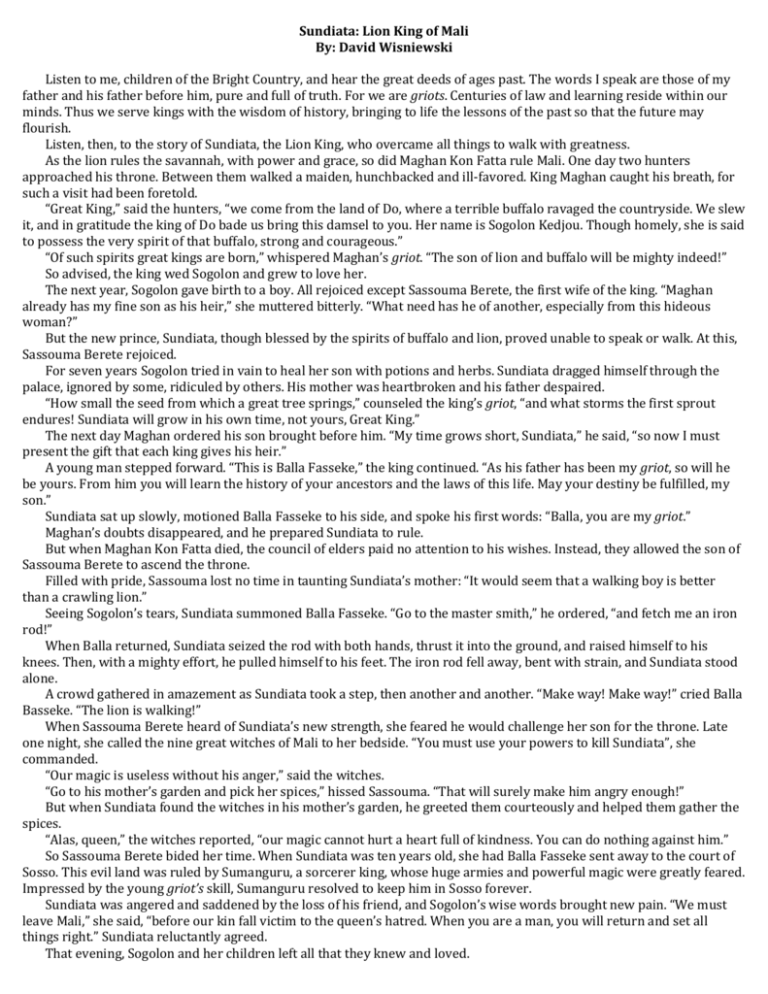
Sundiata: Lion King of Mali By: David Wisniewski Listen to me, children of the Bright Country, and hear the great deeds of ages past. The words I speak are those of my father and his father before him, pure and full of truth. For we are griots. Centuries of law and learning reside within our minds. Thus we serve kings with the wisdom of history, bringing to life the lessons of the past so that the future may flourish. Listen, then, to the story of Sundiata, the Lion King, who overcame all things to walk with greatness. As the lion rules the savannah, with power and grace, so did Maghan Kon Fatta rule Mali. One day two hunters approached his throne. Between them walked a maiden, hunchbacked and ill-favored. King Maghan caught his breath, for such a visit had been foretold. “Great King,” said the hunters, “we come from the land of Do, where a terrible buffalo ravaged the countryside. We slew it, and in gratitude the king of Do bade us bring this damsel to you. Her name is Sogolon Kedjou. Though homely, she is said to possess the very spirit of that buffalo, strong and courageous.” “Of such spirits great kings are born,” whispered Maghan’s griot. “The son of lion and buffalo will be mighty indeed!” So advised, the king wed Sogolon and grew to love her. The next year, Sogolon gave birth to a boy. All rejoiced except Sassouma Berete, the first wife of the king. “Maghan already has my fine son as his heir,” she muttered bitterly. “What need has he of another, especially from this hideous woman?” But the new prince, Sundiata, though blessed by the spirits of buffalo and lion, proved unable to speak or walk. At this, Sassouma Berete rejoiced. For seven years Sogolon tried in vain to heal her son with potions and herbs. Sundiata dragged himself through the palace, ignored by some, ridiculed by others. His mother was heartbroken and his father despaired. “How small the seed from which a great tree springs,” counseled the king’s griot, “and what storms the first sprout endures! Sundiata will grow in his own time, not yours, Great King.” The next day Maghan ordered his son brought before him. “My time grows short, Sundiata,” he said, “so now I must present the gift that each king gives his heir.” A young man stepped forward. “This is Balla Fasseke,” the king continued. “As his father has been my griot, so will he be yours. From him you will learn the history of your ancestors and the laws of this life. May your destiny be fulfilled, my son.” Sundiata sat up slowly, motioned Balla Fasseke to his side, and spoke his first words: “Balla, you are my griot.” Maghan’s doubts disappeared, and he prepared Sundiata to rule. But when Maghan Kon Fatta died, the council of elders paid no attention to his wishes. Instead, they allowed the son of Sassouma Berete to ascend the throne. Filled with pride, Sassouma lost no time in taunting Sundiata’s mother: “It would seem that a walking boy is better than a crawling lion.” Seeing Sogolon’s tears, Sundiata summoned Balla Fasseke. “Go to the master smith,” he ordered, “and fetch me an iron rod!” When Balla returned, Sundiata seized the rod with both hands, thrust it into the ground, and raised himself to his knees. Then, with a mighty effort, he pulled himself to his feet. The iron rod fell away, bent with strain, and Sundiata stood alone. A crowd gathered in amazement as Sundiata took a step, then another and another. “Make way! Make way!” cried Balla Basseke. “The lion is walking!” When Sassouma Berete heard of Sundiata’s new strength, she feared he would challenge her son for the throne. Late one night, she called the nine great witches of Mali to her bedside. “You must use your powers to kill Sundiata”, she commanded. “Our magic is useless without his anger,” said the witches. “Go to his mother’s garden and pick her spices,” hissed Sassouma. “That will surely make him angry enough!” But when Sundiata found the witches in his mother’s garden, he greeted them courteously and helped them gather the spices. “Alas, queen,” the witches reported, “our magic cannot hurt a heart full of kindness. You can do nothing against him.” So Sassouma Berete bided her time. When Sundiata was ten years old, she had Balla Fasseke sent away to the court of Sosso. This evil land was ruled by Sumanguru, a sorcerer king, whose huge armies and powerful magic were greatly feared. Impressed by the young griot’s skill, Sumanguru resolved to keep him in Sosso forever. Sundiata was angered and saddened by the loss of his friend, and Sogolon’s wise words brought new pain. “We must leave Mali,” she said, “before our kin fall victim to the queen’s hatred. When you are a man, you will return and set all things right.” Sundiata reluctantly agreed. That evening, Sogolon and her children left all that they knew and loved. For seven years, the family traveled the harsh road of exile, journeying through forest and plain, from kingdom to kingdom. Rulers fearful of the queen’s displeasure denied them shelter, and some gates were closed against them. Yet Sundiata grew in mind and spirit, even as his body grew in stature and strength. In all these trials, Sundiata never forgot Balla Fasseke. At every court and caravan, he heard of the growing power of Sumanguru and of the unhappy lands under his control. The family ended their travels in the city of Mema. Weary and ill, Sogolon rested by the banks of the Niger. Sundiata found favor with the king of Mema, who took him on campaigns against the mountain tribes that troubled his kingdom. Observing Sundiata’s courage and leadership, he decided to make the young prince his heir. He taught Sundiata the ways of war and government, and looked upon him as a son. One day, frantic messengers pleaded to speak with Sundiata. “Son of lion and buffalo,” they implored, “return to your homeland! Whatever honors you hold in Mema, leave them, and deliver your hand land from fire and sword.” “What has happened?” asked Sundiata. “Sumanguru has invaded Mali,” they said. “The king and his mother have fled. Our people have taken to the bush to fight, but they are leaderless. We have consulted the seers, and they say that only you can save Mali. The throne of your father awaits you.” “The moment has come, my son,” whispered Sogolon. “Your destiny is about to be fulfilled.” Sundiata lost no time. The king of Mema gave him half his army, rank upon rank of armored horsemen carrying great iron spears. Riding at the head of this column, Sundiata stopped at every kingdom that had aided him during his long exile, and gathered more troops. Soon a mighty host covered the savannah, and the thunder of hooves could be heard many miles away. The two armies clashed on the plain of Kirina. All day the battle raged. Astride his gray charger, Sundiata galloped through the fray, searching for Sumanguru. Suddenly, Balla Fasseke was at Sundiata’s side. The two friends embraced. “I escaped from the palace and followed Sumanguru’s army, hoping to find you,” said Balla. “For these seven years I have pretended allegiance to the sorcerer, and I have managed to discover his weakness.” He pulled a wooden arrow from his robe. It was tipped with the spur of a white rooster. “This is the tana of Sumanguru,” Bala continued, “the charm he believes will erase his power. The slightest touch will defeat him utterly!” Sundiata took the arrow and spurred his horse back into battle. He made his way through the dust and confusion to the hill where the sorcerer stood. Notching the arrow, he drew his mighty bow and let it fly. The arrow flew straight and true, cutting through Sumanguru’s cape and grazing his shoulder. At the sight of the tana, the sorcerer let out a harsh cry and galloped from the field. Pursued by Sundiata and Balla Fasseke, Sumanguru fled to the slopes of Mount Koulikoro and staggered into a dark cave. “Powers of night,” he cried, “do not let me fall into the hands of Sundiata!” It is said that Sumanguru then became one with the stone of the cave, for he was never seen again. Disheartened by his flight, the sorcerer’s army went down to defeat. Sundiata returned in glory to Mali. Crowds lined the road the entire journey, shouting his praise. The twelve kings who had aided him in exile and in battle waited at his throne. As Sundiata sat, they drove their spears into the ground before him, swearing allegiance forever. Sundiata spoke softly and Balla Fasseke conveyed his words to the multitude. “Hatred drove me from this land,” he said, “because of what I seemed to be: a crawling child, unworthy of respect and unfit to rule. Mali has suffered great hardship as a result.” “Now I return as your king. Henceforth, none shall interfere with another’s destiny. You, your children, and your children’s children shall find their appointed place within this land forever.” This came to pass, and Sundiata, the Lion King, ruled the Bright Country for many golden years.
